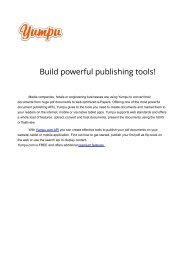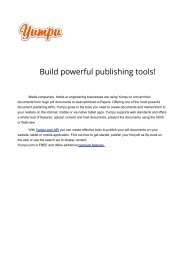test_pdf.pdf
Create successful ePaper yourself
Turn your PDF publications into a flip-book with our unique Google optimized e-Paper software.
MEETING<br />
TODA<br />
ODAY’S PROLIFERA<br />
ROLIFERATION<br />
CHALLENGES<br />
MR. PONEMAN: This is exactly the kind of thing we need to get a grip on. I always thought that the ballistic<br />
missile threat from North Korea was genuine. I didn’t think it was as urgent, and we believed it was not one that<br />
should prevent us from solving the nuclear problem first.<br />
That having been said, we were very clear at the time on the serious consequences of ballistic missile proliferation<br />
from North Korea. I think we should be equally serious with them about it now. It’s harder because we have<br />
this other very large agenda that’s in front of it, and Bob Einhorn could speak authoritatively to how close we came<br />
to a more effective and perhaps verifiable kind of missile proliferation resolution with North Korea.<br />
MR. GALLUCCI: Did we not have the Spanish interdict a shipment of North Korean SCUD-like missiles?<br />
MR. PONEMAN: Right.<br />
MR. GALLUCCI: And we let them go. So do you have a cut off here? If it’s extended range MRBM [mediumrange<br />
ballistic missiles] we stop them with force, otherwise we let them go, or…<br />
MR. PONEMAN: No. I would use the MTCR [Missile Technology Control Regime] parameters as a critical<br />
parameter. I would try to get the kind of international cooperation that the PSI is proposing. If I could get that kind<br />
of support and if I could interdict the ship, I would.<br />
MR. GALLUCCI: All right. And last and not least, we have the Nunn-Lugar question and whether that is<br />
what you had in mind for Iraq. That is actually how I heard you.<br />
MR. EINHORN: Actually it’s a program that’s underway. The State Department is putting in place a program<br />
in Iraq. It’s analogous to the International Science and Technology Center in Moscow and the one in Kiev. It’s<br />
designed to find out who these scientists are and put them to gainful employment in civilian projects and try to<br />
make sure they’re not peddling their expertise elsewhere.<br />
Let me, if I can come back on the missile question. There’s no way you’re going to get a universal agreement to ban<br />
all missiles above a certain range. That’s not going to happen. You’re also not going to be able to get a kind of missile<br />
NPT where some countries can keep long-range missiles and others have to give them up. That’s not going to happen<br />
either. You have to go at the missile problem in different ways. Part of it the U.S. does through dealing with each country<br />
in turn. We negotiated an arrangement with South Korea on the range of its missiles. We tried to negotiate an agreement<br />
with North Korea. We came pretty far, but we had other issues to work on.<br />
This arrangement in Libya is going to bring down their missile capability to below the so-called MTCR<br />
threshold, so ad hoc, country-by-country, is one element of it. Regionally is another. Various regions have considered<br />
constraints on missiles. You’re not going to have a universal agreement on missiles.<br />
MR. GALLUCCI: Let me thank the panel and thank you, audience.<br />
39<br />
39
















